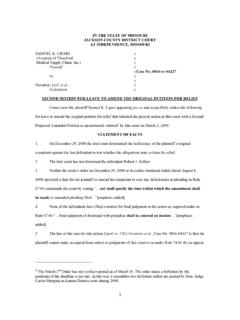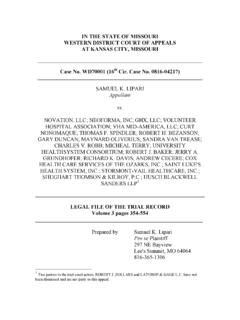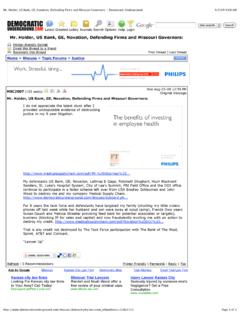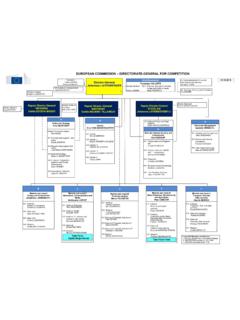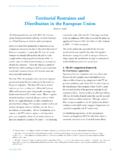Transcription of GAO-02-690T Group Purchasing Organizations: Pilot Study ...
1 GAOU nited States General Accounting OfficeaTe s tim o nyBefore the Subcommittee on antitrust , competition , and Business and Consumer Rights, Committee on the Judiciary, Senate For Release on Delivery Expected at 2:00 , April 30, 2002 Group Purchasing ORGANIZATIONSP ilot Study Suggests Large Buying Groups Do Not Always Offer Hospitals Lower PricesStatement for the Record by William J. Scanlon Director, Health Care Issues GAO-02-690 TPage 1 GAO-02-690T Mr. Chairman and Members of the Subcommittee:We are pleased to have the opportunity to comment on the role of Group Purchasing organizations (GPO) in the marketplace for medical devices used in hospitals.
2 Faced with persistent pressures to cut their costs, hospitals over the past two decades have increasingly relied on specialized private firms GPOs to keep the cost of supplies in check. Hospitals buy everything from sophisticated medical devices for example, cardiac defibrillators to commodities such as saline solution through GPO-negotiated contracts. By pooling the purchases of their member hospitals, these specialized firms are intended to negotiate lower prices from vendors (manufacturers and distributors), which can benefit hospitals and, ultimately, consumers and payers of hospital care (such as insurers and employers).
3 The price advantages of a GPO are expected to be greater for large GPOs, which negotiate on behalf of nearly 2,000 hospitals. To increase its leverage with vendors, a GPO often selects only certain manufacturers and vendors of a product to include in its catalog. According to GPOs, this selection of some vendors and exclusion of others reflects judgments about both product quality and price. Some manufacturers especially small manufacturers of medical devices allege that contracting practices of some large GPOs have blocked their access to hospitals Purchasing decisionmakers.
4 The manufacturers contend that these practices ultimately deny patients access to innovative or superior medical devices. These concerns have spurred calls for reexamining federal antitrust guidelines regarding GPOs. Issued in 1993, these guidelines articulate an antitrust enforcement policy that affords GPOs considerable latitude to merge and grow. The policy has permitted the creation and growth of the largest GPOs, formed in the 2 GAO-02-690T To assist the Subcommittee as it considers GPOs effects on medical device Purchasing , this statement provides an overview of the GPOs and their operations and summarizes results from our Pilot Study , which the Subcommittee requested, of a selected metropolitan area s hospital Purchasing .
5 This Study was exploratory, testing the feasibility of collecting price and purchase data for medical devices, and will be followed by a broader Study covering more areas, devices, GPOs, and hospitals. Specifically, this statement details (1) the extent to which, in one market, hospitals buying pacemakers and safety needles saved money by using a GPO contract and (2) the extent to which these hospitals purchased pacemakers and needles from small manufacturers. To learn about GPO operations, we interviewed officials of 11 hospitals, four GPOs, nine medical device manufacturers, two industry associations, and the Department of Justice (DOJ).
6 We established the feasibility of collecting price and purchase data on medical devices by obtaining such data on pacemakers and safety needles1 for 2000 from 18 hospitals in one greater metropolitan We chose to Study pacemakers and safety needles because they are two types of medical devices that are commonly purchased by hospitals. Hospitals in our sample purchased 121 models of pacemakers and 196 models of safety needles. We compared GPO-negotiated prices to prices obtained by hospitals Purchasing on their own. Because all these hospitals did not purchase each model, price comparisons were only possible for subsets of models.
7 Taken together, comparisons involved contracts of eight GPOs, 23 models of safety needles, and 42 models of pacemakers. In many cases, more than one hospital purchased a particular device; in those cases, the price refers to the median price. We also used the purchase data to determine the extent to which these hospitals purchased these devices from small manufacturers. We did not independently verify the information in appendix I. Our work was conducted from October 2001 through April 2002 in accordance with generally accepted government auditing term safety needle includes many different types of devices with features to reduce the risk of needlestick injuries for health care data did not reflect manufacturers rebates which hospitals may receive regardless of whether they used a GPO contract or purchased items on their own or other payments earned by hospitals Purchasing with a GPO contract.
8 In our statement, the term hospitals refers to single facilities as well as health systems with multiple hospitals. Seven hospitals reported safety needle data for 3 GAO-02-690T In summary, for the hospitals that we studied, a hospital s use of a GPO contract did not guarantee that the hospital saved money: GPOs prices were not always lower and were often higher than prices paid by hospitals negotiating with vendors directly. Specifically, we examined price savings with respect to three factors: Whether hospitals using GPO contracts got better prices than hospitals that did their own contracting varied widely by product model.
9 For some pacemaker models, the hospitals using GPO contracts got considerably better prices up to 26 percent lower than the hospitals not using a GPO contract. But for other models, hospitals using a GPO contract got prices that were much worse up to 39 percent higher than hospitals not using a GPO contract. Similar results held for hospitals using large GPOs those whose members purchase more than $6 billion per year with their contracts compared to hospitals buying on their own. Price savings differed by size of hospital. Large hospitals those with more than 500 beds often obtained lower prices on their own than by using a GPO.
10 By contrast, small and medium-sized hospitals were more likely to obtain price savings using a GPO contract. But these hospitals experiences also ranged widely: Some hospitals GPO contract prices were much lower and others much higher than prices negotiated by hospitals on their own. Price savings had little relationship to the size of the GPO. Hospitals using contracts of large GPOs those whose members purchase over $6 billion per year with their contracts did not necessarily obtain better prices than hospitals using smaller GPOs contracts. This lack of consistent price savings is contrary to what would be expected for large the metropolitan market we studied, hospitals bought pacemakers and safety needles predominantly from large manufacturers.


